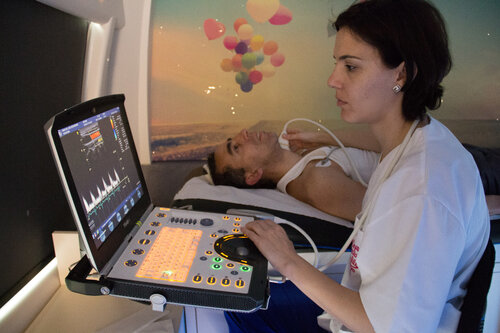Adherence to the Mediterranean diet, key to preventing serious cardiovascular disease
According to research led by the two CERCA centres, IRBLleida and the Sant Pau Research Institute, based on participants in the ‘El Bus de la Salut’ project
Adherence to the Mediterranean diet could play a key role in the prevention of subclinical atherosclerotic disease, a condition that develops silently before it causes serious cardiovascular disease, according to a new study conducted in the cohort of people participating in the 'Bus de la Salut' (ILERVAS) project. The research, led by researchers from the two CERCA centres, the Institute of Biomedical Research of Lleida (IRBLleid ) and the Sant Pau Research Institute, has been published in the journal Nutrients.
The study, which included 3,097 participants, showed that a healthy Mediterranean diet, rich in nuts, vegetables, fish and olive oil, was associated with a significant reduction in atherosclerotic plaques in the arteries. Specifically, the researchers observed a 3% decrease in the number of plaque-affected territories in those participants with greater adherence to the Mediterranean dietary pattern, as measured by the MEDAS (Mediterranean Dieto Adherence Screener) scale.
'We designed a healthy lifestyle index based on the Mediterranean diet and physical exercise to assess its relationship with atherosclerotic plaque progression. Although the overall score showed no association with progression, when we analysed the components separately we found that exercise did not offer significant protection, while adherence to the Mediterranean diet was associated with less progression of atherosclerotic plaques,' said Marina Rojo, a researcher in the Endocrinology, Diabetes and Nutrition group at IR Sant Pau and first author of the paper.
'This research underlines the benefits of the Mediterranean diet on cardiovascular health, demonstrating that it not only helps prevent disease, but can also reduce the progression of atherosclerosis, one of the main risk factors for heart disease,' explained Marcelino Bermúdez , professor at the University of Lleida and researcher in the translational vascular and renal research group at IRBLleida. 'These results show that promoting adherence to the Mediterranean diet, in addition to the management of traditional risk factors such as hypertension and smoking, could be an effective public health intervention to prevent atherosclerosis and reduce the burden of cardiovascular disease in society,' added the researcher.
Although physical activity did not show a significant association with atherosclerotic disease progression in this study, the results suggest that the Mediterranean diet may play a more prominent role in protecting against atherosclerosis. This finding reinforces the importance of a healthy diet as a fundamental part of a comprehensive strategy for cardiovascular prevention.
The study has also identified other risk factors for the future development of fatty plaques in the arteries, such as older age, hypertension, smoking and dyslipidaemia. In addition, the researchers found that female sex may have a protective effect on disease progression.
This research has been funded by the CIBER-Consorcio Centro de Investigación Biomédica en Red-(CB15/00071) of the Instituto de Salud Carlos III, the Ministry of Science, Innovation and Universities, the Plan Estratégico de Investigación e Innovación en Salud (PERIS ) 2021-2024 of the Generalitat de Catalunya, the Agencia Estatal de Investigación, the European Union 'NextGeneration EU', the Agencia para la Gestión de Ayudas Universitarias y de Investigación, the Diputación de Lleida, the European Regional Development Fund 'Una forma de hacer Europa'; the Centre for Biomedical Research Network in the thematic area of Biomedical Engineering, Biomaterials and Nanomedicine (CIBER-BBN) and the CERCA Programme/Generalitat de Catalunya.
Article: Rojo Lopez MI, Bermúdez Lopez M, Castro E, Farras C, Torres G, Pamplona R, Lecube A, Valdivieso JM, Fernández E, Julve J, et al. Mediterranean Diet Is a Predictor of Progression of Subclinical Atherosclerosis in en Mediterráneo Población: The ILERVAS Prospective Cohort Study . Nutrientes . 2024; 16(21):3607. https://doi.org/10.3390/nu16213607

The study included 3,097 participants in the ‘Health Bus’






